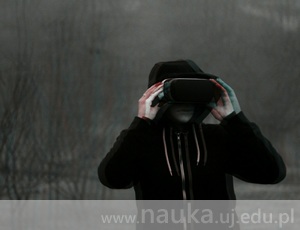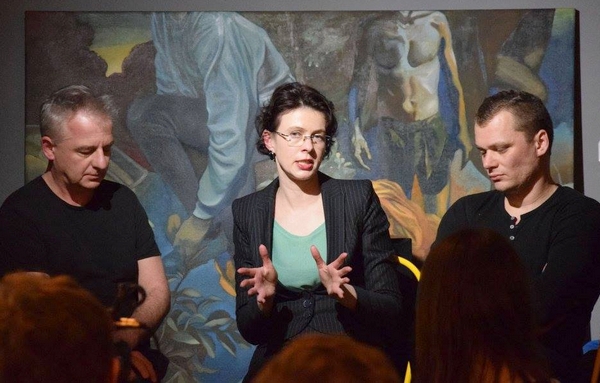
Artificial intelligence, transhumanism, bionics, nanobots – these are just some of the subjects that pop up when we discuss the future. Each of them presents us with a vision of the coming years and centuries so innovative and futuristic that we’re barely able to comprehend it with the limited set of thoughts and experiences we possess today.
One of the methods of imagining what may happen – maybe the only one – is discussion and dialogue. On 23 January 2017, a group of enthusiasts gathered in Klub Pinakoteka to debate on the issues we may face in the future. The meeting was organised by the Kraków branch of the Polish Rationalist Association, composed chiefly of JU students and staff, including Dr hab. Joanna Hańderek.
The event, entitled ‘Artificial Intelligence – Questions about Man’, featured two special guests: Sidey Myoo (real name: Michał Ostrowicki), a professor of philosophy at the Jagiellonian University, creator of the Academia Electronica and author of Ontoelektronika [Ontoelectronics], one of the most important Polish books about realities made possible by the advancement of technology, and Dr Michał Klincewicz from the JU Institute of Philosophy, who specialises in cognitive studies with particular emphasis on concepts such as consciousness, time, perception, cognition, artificial intelligence, and morality.
Those who believe the future to be cold, sterile and automatic would’ve been amazed to see a lively discussion, constructive criticism and a multitude of answers to a very basic question: who will we become?
Who will we become? Artificial intelligence
For many, the adjective ‘artificial’ denotes something of a lesser quality, something limited or incomplete. ‘Why?’, asked Sidey Myoo. ‘Why would silicon-based intelligence be worse than carbon-based intelligence? We’re definitely bigoted on this subject’, he added.
Dr Klincewicz raised the issue of differences between artificial intelligence and human intelligence. What similarities will they share? Some common principles or logical processes, perhaps? Will we even be able to see the emergence of artificial intelligence? After all, it won’t just be a simple shutter-closing system for our windows, but rather something that learns, changes and creates on its own.

One noteworthy example of what may become part of our everyday life is the IBM Watson computer, particularly its medical application – Watson Cognitive Healthcare. It’s a diagnostic and health care system that operates on the basis of patient interview, enormous medical databases and constant self-improvement through studying latest research papers (according to IBM, it can read 200,000,000 pages in three seconds). Tests revealed that its diagnoses on lung cancer are 90% accurate, which is an impressive accomplishment, since the average for human doctors is 50%.
‘If we accept Watson’s diagnoses, will we be able to accept them when they come out of the mouth of a humanoid robot?’, asked Dr Klincewicz.
Who will we become? Robotics
The most apparent conclusion reached during the debate in Pinakoteka is that there are many more questions than answers. It’s no different in the case of robots, machines that could potentially reach a certain level of consciousness – low, great or even exceeding our imagination.
Strangely, the discussion about robots was related mainly to the positive emotions we have for them. Could we love them like we love other humans? And, conversely, could we hate them? Will the advent of automatons mean that we’ll own slaves who will be subject to our anger, frustration and violence?
We can implement moral values into artificial intelligence, since a lot of them can be translated into algorithms.
We may assume that the robots themselves will have certain positive or negative sentiments towards humans. There is a chance that the line which separates a machine designed to make our life easier from an entity capable of feeling emotions. It could be conceived of by a human programmer, or it could be the result of evolving AI. Our culture provides us with many possible scenarios – we just have to look at TV series such as Black Mirror or Humans.
‘The ethics of robots will depend on us. For instance, if their behaviour would be based on computer games, there would be massive differences between robots playing Counter Strike and The Sims’, claimed Sidey Myoo. But it’s more complicated than that. The artificial intelligence would have to be able to recognise evil, shun it, and conduct itself morally. And that’s not all, since there are cases in which morally wrong actions may lead to good outcomes, like in the famous question: ‘Should a driverless car carrying a human passenger self-destruct if it results in saving a bus full of people?’.
‘We can implement moral values into artificial intelligence, since a lot of them can be translated into algorithms’, said Dr Klincewicz. In response to that, a voice from the audience asked: ‘So maybe we should build a society of ethically perfect machines, and then fade away from existence as a lesser beings?’.
In this way, we return to the first question we asked in the meeting: who will we become?
Who will we become? Transhumanism
Basically, a transhuman or post-human is an individual that uses technology to exceed its physical and mental capabilities. Could this refer to the contemporary man, who uses a smartphone for long-distance calls and instant fact checking? Or perhaps it began earlier, when our ancestors first created a looking glass? Generally speaking, when we talk about transhumanism, we mean technologies that are an integral part of the human organism, functioning the same as our biological organs. A great example of this is Oscar Pistorius, who uses advanced prostheses in professional running.
So can a post-human still be called Homo sapiens? Where’s the line between a ‘standard’ human being (however awkward this may sound) and an augmented one? For some, augmented people are still people, for others, they are something else, hybrids, or even non-biological entities.
Such vast differences in definitions – we know that from the history of wars and religions – will inevitably be the cause of conflict and strife. The world may be divided into areas that accept post-humans and areas where they are exterminated. It’s a grim prospect, but a possible one, since in time transhumanism will become mass phenomenon.
These conflicts will also have socio-economic aspects. State-of-the-art technology isn’t cheap, so some augmentations will only be available to the rich. However, it’s not set in stone: there may come a change in corporate politics which will make it possible for the majority to become transhuman – a case not unlike our access to cars, smartphones and wireless internet connection. If you pay more, you get a better quality equipment, but the basic features are still available to everybody. Technological snobbery doesn’t seem to be a source of antagonism so great that it encompasses entire the entire society.
However, it may very well be that our certainty of the continuing advancement of technology will be put to the test. Maybe our scientists encounter a glass ceiling made of our ignorance, economy, cognitive abilities and tolerance. Maybe, after decades of rapid technological progress, we’ll go through a slower period. In the 1960s, after our first successful space ventures, we predicted a swift colonisation of the Moon and Mars. And yet we’re still here on Earth.
Original text: www.nauka.uj.edu.pl





